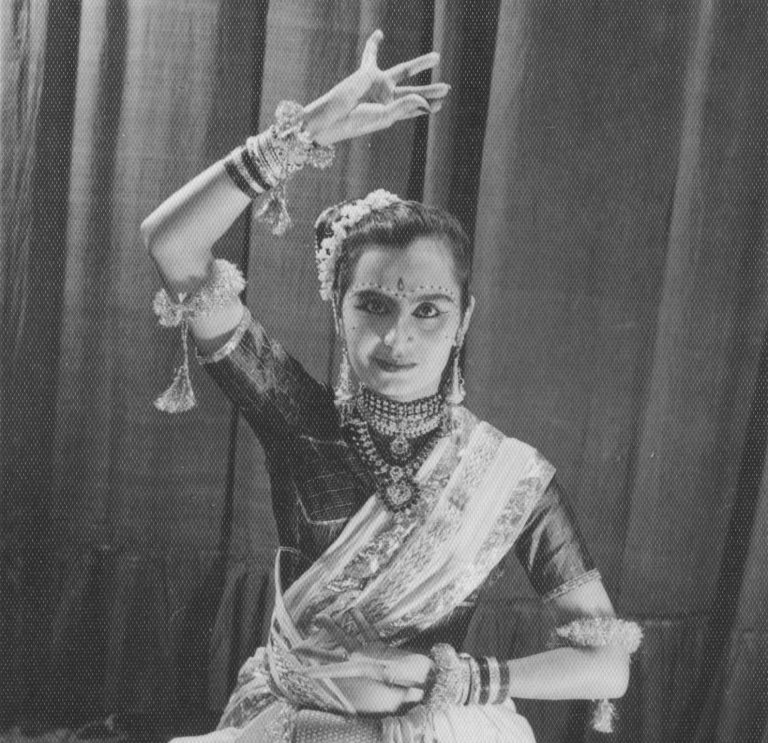
One must let go of ego, it is only then that the Master’s grace pours in to you. One must be humble and learn to accept everything that happens knowing that there is a meaning of mercy in all that happens and that everything happens according to a Universal plan – Triveni Dadlani
A piece from Saaz Aggarwal’s book’ The Amils of Sindh’, contributed by Triveni Dadlani
Before marriage, my mother was Saraswati Ramchand Malkani. The family lived in Malkani Ghitti, Hyderabad. They were landlords, wealthy for seven generations, owners of bunnyoon (farmlands) and buildings. In c1941 they moved to live in Karachi, in Malkani Mansion on Bunder Road, opposite a Muslim cemetery.
Saraswati was the youngest of three sisters. Her father, Ramchand, had died when she was just forty days old. The head of the family was his brother Dr. Sahijram. My mama Gurbaksh went to London to study and became a barrister, and the other mama Ajit Singh was given charge of the family lands, a holding of more than 3000 acres.
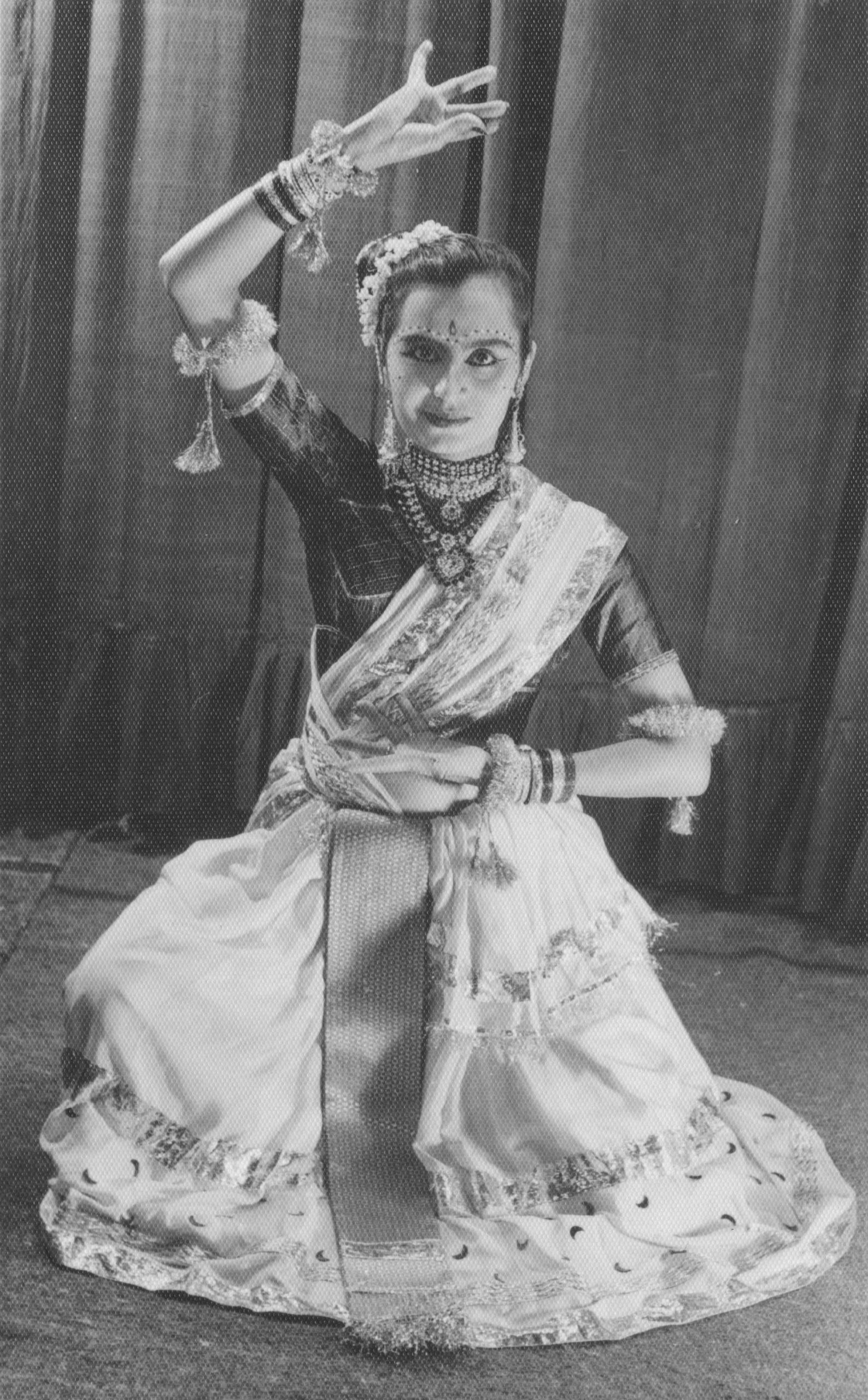
When Partition came, Malkani Mansion was attacked by a mob. They ransacked the doctor’s clinic on the ground floor. As they climbed to the next floor, loot maar kayoon – they looted the houses on the first floor then attacked the second floor. On the third floor they met a Muslim who stopped them, saying that there were no Hindus on the fourth floor. When they refused to believe him, he swore on the Quran, insisting that there were no Hindus upstairs. It was this false promise, made on the Holy Quran, that saved my mother and her family. If it hadn’t been for that Muslim, I would not be here today.
In exchange for the family’s 3000-plus acres of land, the Indian government gave my mamas two bungalows, one in Bangalore and one on Versova beach. So my mother, in her twenties, lived in Bangalore for a few years. She learnt Bharatanatyam and her stage performance was reported in the English newspaper along with her photo. Being very beautiful and with a twenty-four inch waist, she participated in the Miss Bangalore beauty contest and won the title.
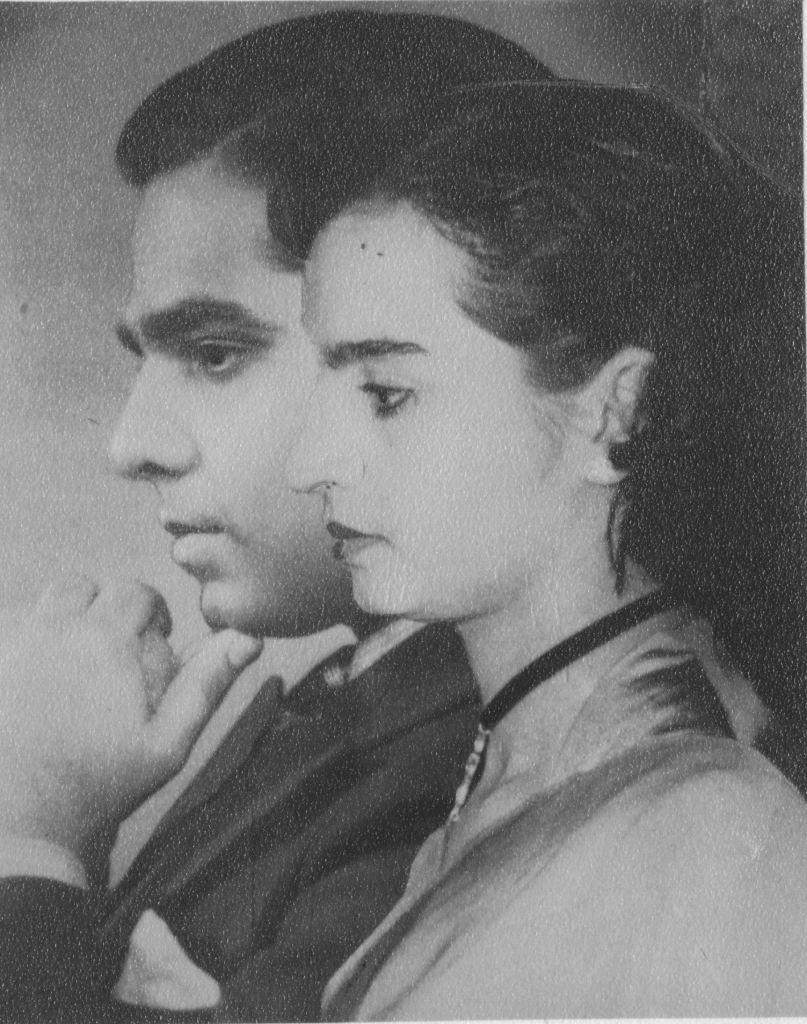
By this time, it was already several years since she and my father had decided to marry each other. However, there was a lot of opposition from the family because their mothers, Sita Ramchand Malkani and Lachmi Gidumal Alimchandani, were sisters. People were shocked and disapproving.
Gidumal worked for the Railways. He had two sons, Jetho and Mulo, and they ran White House, a top-end store for men’s clothing. My father Mulo was a student of DJ Sind College and he used to tell us that he played cricket with Zulfiqar Ali Bhutto.
With his exams coming up, he needed a quiet place to study and his mother Lachmi sent him to stay with her sister Sita who lived in a more spacious house. That was when Mulo fell in love with Saraswati. He pursued her so long and so determinedly, despite all the family’s efforts to keep them apart, that Saraswati too realized that he was the man for her. They both declared that they would never marry anyone else and they stuck to their guns for so long – in those twenty years babies were born and grew to adulthood – that everybody got fed up and they finally got married.
Dada’s influence on my life
I was born in Bombay in 1964, their only child, and grew up in Candy Castle where my father’s family had taken two flats on pagri after Partition. My father worked in the Export division of Garware Plastics. Every morning before he left for work, he would bow before me and say, “You are my Lakshmi!” In the evening he came home bringing me some toy or other, every single day. He also had to travel abroad on work quite frequently. But when I was eleven years old, he had his first heart attack, and he died before the ambulance arrived.
Dada Jashan came to condole with us. Our mothers were related and his mother visited our home occasionally. Our family had been introduced to the Sadhu Vaswani Mission by Asha (Nirmala) Shahaney who lived in Gitanjali building in Colaba, where the Mission held daily satsangs. She and my mother were dear friends, like sisters to each other. My parents and I attended Dada’s satsangs in Bombay at the RK Academy School along with the Shahaneys and their children Dinesh and Rekha. We would all stand in the parking area and do juti ka seva. People took off their shoes and gave them to us and we put them on the rack and gave them a token. Once Dada started speaking, some of the adults would go in to listen. At the end, Dada would come out and we would stand in a line and he would bless us. My mother would return home and tell my three unmarried pupphis, who lived with us, what she had heard and I would be listening too. As I grew older, I was drawn to Dada’s teachings and started attending the satsangs and enjoying his discourses and the bhajans. At times when I was listening to the bhajans, tears would flow from my eyes.
When I was appearing for my school-leaving SSC examination, I went totally blank in my Physics paper. I was panicking but I knew my choices. I could cheat. Or I could leave my paper blank. Or I could just write what I knew. But I had forgotten everything! I prayed to Dada: Help me! I don’t want to cheat. And I don’t want to fail. Help me! I wrote what I knew. And nobody was more surprised than me when I got a first class.
When I was twenty-seven years old, my mother and aunts decided to sell our home in Bombay and move to Poona where our joint family, my chachi and her unmarried son, my pupphis, and the two of us, could live in separate apartments in the same building. So I left my job and my friends and came to live in a place where things were quite different from what I was used to. I was lonely and anxious and would pray at the sacred Samadhi of Dada TL Vaswani. And I started noticing that whatever I was praying for would come true.
When it was time for marriage my mother showed Dada the proposals she had received and he selected Haresh Lalchand Dadlani for me. Dada himself conducted our ring ceremony. That day, Dada made us promise:
He is the only man for you, in thought,
in word and in deed.
She is the only woman for you, in thought,
in word and in deed.
If you ever fight, you will make up before sunset.
You will treat each other’s mothers exactly the way you treat your own mother. Never prevent each other from meeting his or her mother!
If either of you ever decide to proceed on the spiritual path, the other will not come in the way.
And he made Haresh promise that he would never hit me, even with a flower! We have both tried our best to keep our promises.
Another time, when I was in my forties, I went to satsang on my birthday, hoping and praying for a meaningful look from Dada; I got that and more.
There was a crowd, but Dada saw my folded hands and tears of longing, and gave me the gaze of his blessing. Our eyes locked for a few magical seconds.
I was filled with positive vibrations and my throat was choked with emotion.
Dada told one of his devotees, “Hinna khe kuch diyo – give her something”.
I received a handkerchief to wipe my tears, a torch to light my way on the path of life, and a lamp to eradicate the darkness of ignorance from my heart. I treasure those gifts and the messages they carry.
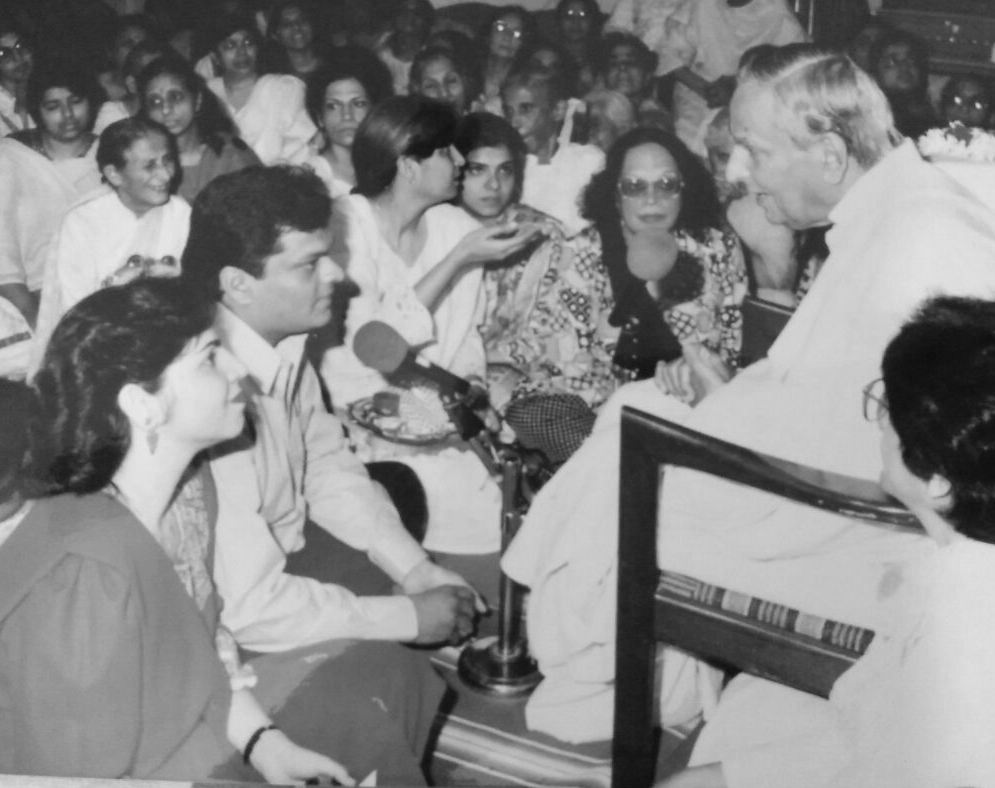
Haresh and I have been blessed with two lovely daughters, Richa (1997) and Bhavna (2003). When our younger one, Bhavna, was nine, she came home one day from a birthday party with a stomach ache. Her symptoms increased. She could not eat and stopped passing stools, lying on the bed in pain while I looked on helplessly. No treatment was giving relief, no test was giving a treatable diagnosis. Bhavna stopped going out, she missed school, she lost her friends. And her morale went downhill. I prayed nonstop that my daughter’s pain would subside and that she would go out and play like other children. I wrote a letter to Dada. So at the satsang he called her to him and blessed her, giving healing energy with his hand to her abdomen. She felt better but she was still not well. Dada seemed to know this because two days later he called us to his home and prayed over her again. Bhavna’s pain disappeared. He told her that if the pain recurred she should tell him, and if she ever had any trouble she should chant Satnam mushqil asaan. Piya Uttamchandani from the Mission filmed the scene.
We have had many miracles like this. Till today, whatever I have prayed for and asked for at the Samadhi I have got. There are times when I have experienced a current passing through me when I stood and prayed at the Samadhi. Listening to Dada’s discourses, my little brain has understood that on the path of life, one must learn to surrender everything to God. One must let go of ego, it is only then that the Master’s grace pours in to you. One must be humble and learn to accept everything that happens knowing that there is a meaning of mercy in all that happens and that everything happens according to a Universal plan. Most important is to have an attitude of gratitude, and that prayer can move mountains. I have experienced this. Dada’s message can be encapsulated in just one word: LOVE LOVE LOVE.
______________________
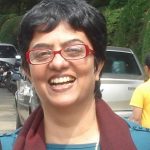 Saaz Aggarwal is an independent researcher, writer and artist based in Pune, India. Her body of writing includes biographies, translations, critical reviews and humour columns. Her books are in university libraries around the world, and much of her research contribution in the field of Sindh studies is easily accessible online. Her 2012 Sindh: Stories from a Vanished Homeland is an acknowledged classic. With an MSc from Mumbai University in 1982, Saaz taught undergraduate Mathematics at Ruparel College, Mumbai, for three years. After a career break when she had a baby, during which time she established a by-line as a humour writer, she was appointed features editor at Times of India, Mumbai, in 1989, where she launched Ascent, the highly successful HR pullout of the Times of India Group. From 1998 to 2006, she was HR and Quality Head of Seacom, an Information Technology company based in Pune. As an artist, she is recognized for her Bombay Clichés, quirky depictions of urban India in a traditional Indian folk style, as well as a unique range of offerings at the annual Art Mandai event in Pune. Her art incorporates a range of media and, like her columns, showcases the incongruities of daily life in India.
Saaz Aggarwal is an independent researcher, writer and artist based in Pune, India. Her body of writing includes biographies, translations, critical reviews and humour columns. Her books are in university libraries around the world, and much of her research contribution in the field of Sindh studies is easily accessible online. Her 2012 Sindh: Stories from a Vanished Homeland is an acknowledged classic. With an MSc from Mumbai University in 1982, Saaz taught undergraduate Mathematics at Ruparel College, Mumbai, for three years. After a career break when she had a baby, during which time she established a by-line as a humour writer, she was appointed features editor at Times of India, Mumbai, in 1989, where she launched Ascent, the highly successful HR pullout of the Times of India Group. From 1998 to 2006, she was HR and Quality Head of Seacom, an Information Technology company based in Pune. As an artist, she is recognized for her Bombay Clichés, quirky depictions of urban India in a traditional Indian folk style, as well as a unique range of offerings at the annual Art Mandai event in Pune. Her art incorporates a range of media and, like her columns, showcases the incongruities of daily life in India.